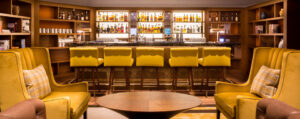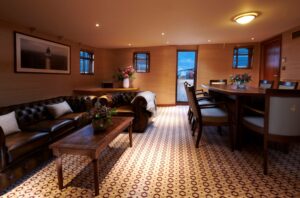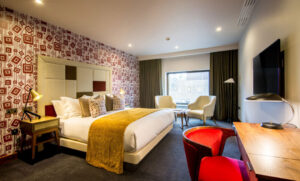What is the Contract Furniture industry?
The hotel contract furniture industry refers to a sector within the broader furniture industry that specializes in producing furniture specifically designed and manufactured for commercial and institutional environments. Contract furniture, unlike residential furniture, serves its purpose in non-residential spaces such as offices, hotels, restaurants, healthcare facilities, educational institutions, and public spaces.
Key Characteristics of the Contract Furniture
- Commercial Focus: Contract furniture is designed to meet the unique needs and demands of commercial and institutional settings. This includes considerations for durability, functionality, ergonomics, and aesthetics that cater to the requirements of businesses and institutions.
- Customization: Many contract furniture manufacturers offer customization options to meet the specific design and space requirements of their commercial clients. This can include selecting different materials, finishes, and configurations to suit the project.
- Quality and Durability: Contract furniture is built to withstand heavy use and wear and tear. It often undergoes rigorous testing to ensure it can meet the demands of high-traffic environments.
- Ergonomics: In office settings, ergonomic features are crucial to ensure the comfort and productivity of employees. Contract furniture often incorporates ergonomic design principles to provide users with ergonomic support.
- Safety and Compliance: Contract furniture may need to comply with specific safety and fire regulations depending on the industry and location in which it is used. Manufacturers must adhere to these standards.
- Project-Based Sales: Contract furniture is typically sold on a project basis. Furniture suppliers work with architects, interior designers, and project managers to provide furniture solutions that fit the unique requirements of a particular project.
- Sustainability: Like in other industries, sustainability has become a significant concern in the contract furniture industry. Many manufacturers now prioritize eco-friendly materials and manufacturing processes.
- Distribution Channels: Specialized dealers or distributors often distribute contract furniture to meet the needs of commercial clients. This differs from residential furniture, which retail outlets more commonly sell.
Overall, the contract furniture industry plays a critical role in shaping the aesthetics, functionality, and comfort of non-residential spaces. It involves the collaboration of furniture manufacturers, designers, architects, and clients to create furniture solutions that meet the specific requirements of various commercial and institutional environments.
Hotel Contract Furniture UK
Hotel contract furniture encompasses a wide range of pieces designed specifically for use in hotel rooms and public spaces. Here are ten types of hotel contract furniture commonly found in hospitality settings:
- Bedroom Furniture: This includes beds, headboards, nightstands, dressers, wardrobes, and armoires. Comfort and durability are essential for these pieces.
- Seating Furniture: Lounge chairs, armchairs, and sofas for guest rooms and common areas. They should be both comfortable and stylish.
- Dining Furniture: Tables and chairs for hotel restaurants, breakfast areas, and dining rooms. These need to be durable and easy to clean.
- Workstation Furniture: Desks and chairs for business travelers. These should be functional and ergonomic.
- Outdoor Furniture: Patio and poolside furniture for outdoor spaces such as courtyards and pool areas. Weather-resistant materials are essential.
- Lobby and Reception Furniture: Sofas, coffee tables, reception desks, and accent chairs for welcoming guests in the lobby area.
- Conference and Meeting Room Furniture: Tables, chairs, and presentation equipment for business meetings and conferences. Comfort and functionality are crucial.
- Restaurant and Bar Furniture: Barstools, restaurant chairs, dining tables, and bar counters for hotel dining and entertainment areas. These should be both stylish and comfortable.
- Guest Room Accessories: Mirrors, luggage racks, minibars, and in-room safes. These accessories enhance guest convenience.
- Public Area Furniture: Furniture for common spaces like lounges, corridors, and hallways. Comfortable seating and aesthetically pleasing designs are key.
Each of these furniture types serves a specific function within the hotel environment, contributing to the overall guest experience and the hotel’s ambiance and style. When selecting contract furniture for your hotel, it’s essential to consider the design, durability, and comfort of each piece to ensure they align with your hotel’s brand and meet the needs of your guests.
What is Bespoke Hotel Contract Furniture
“Bespoke hotel contract furniture” refers to custom-made furniture specifically designed and manufactured for hotels and other hospitality establishments under contractual agreements. This term encompasses several key aspects:
Customization:
“Bespoke” means the furniture is made to order, tailored to the specific needs, style, and requirements of a particular hotel or project. It’s not off-the-shelf furniture but rather a personalized solution. This level of customization allows hoteliers to create unique and distinctive interior environments that align with their brand identity and vision.
Elevating Hospitality Design:
The term “bespoke” suggests a focus on design excellence. Bespoke hotel contract furniture goes beyond functional requirements; it emphasizes aesthetics, style, and creating memorable guest experiences. It often incorporates high-quality materials, innovative design elements, and craftsmanship to achieve this.
Functionality:
While design is a crucial aspect, bespoke hotel contract furniture also prioritizes functionality. Hotel furniture must meet specific operational needs, including comfort, durability, and ease of maintenance. Bespoke solutions consider these requirements while ensuring that the furniture aligns with the hotel’s overall design concept.
Collaborative Process:
Creating bespoke hotel contract furniture typically involves close collaboration between hoteliers, interior designers, architects, and furniture manufacturers. This partnership ensures that the furniture not only looks and functions well but also integrates seamlessly into the overall design scheme of the hotel.
Quality and Durability:
Bespoke furniture is expected to be of high quality and built to last. It often undergoes rigorous testing to ensure it can withstand the rigors of the hospitality industry. Durability is essential to minimize maintenance and replacement costs.
Uniqueness:
Bespoke furniture is often one-of-a-kind or part of a limited collection, making it exclusive to a particular hotel or project. This exclusivity enhances the hotel’s identity and can be a selling point for guests seeking a unique experience.
Cost Considerations:
While bespoke furniture offers customization and uniqueness, it can also come at a higher cost compared to off-the-shelf options. Hoteliers need to weigh the benefits of customization against their budget constraints.
Innovations in Care Home Furniture: Enhancing Quality of Life
10 benefits of Bespoke Hotel Contract Furniture
- Tailored to Your Brand: Bespoke furniture allows you to create pieces that align perfectly with your hotel’s brand identity, style, and theme, enhancing the overall guest experience.
- Unique Designs: Custom furniture enables you to design one-of-a-kind pieces that set your hotel apart from competitors, making a lasting impression on guests.
- Optimized Space: Designers can create bespoke furniture to maximize available space, especially in rooms with unique layouts or space constraints.
- High-Quality: You can control the materials used, ensuring the selection of only the finest and most durable options, which leads to long-lasting furniture.
- Custom Finishes: Choose finishes, fabrics, and colors that match your hotel’s aesthetic, providing a cohesive and elegant look throughout the property.
- Guest Comfort: Tailored furniture considers guest comfort, providing ergonomic designs and the option to use premium cushions and padding.
- Brand Consistency: Ensure consistency in design across all areas of your hotel, from guest rooms to public spaces, reinforcing brand recognition.
- Local Craftsmanship: Collaborating with local artisans and craftsmen can promote local businesses and support the community while ensuring high-quality workmanship.
- Long-Term Investment: Custom furniture, built to your exact specifications, is an investment that pays off over time as it remains in excellent condition, reducing the need for frequent replacements.
Get in touch with our team.
Visit Us on LinkedIn




